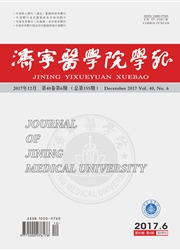

 中文摘要:
中文摘要:
目的自噬是真核细胞内的一种主要消化降解途径。动物实验研究表明细胞的自噬功能随年龄增长逐渐下降,但在人体内尚未见系统性研究报道。因此,我们对健康成人外周血白细胞的自噬活性与年龄相关性进行了探讨。方法LC3基因是自噬过程中的关键基因之一,其编码蛋白经过修饰后形成的耦合蛋白LC3一II是自噬体和自噬溶酶体的膜标记蛋白。在该研究中,我们在基因表达和蛋白水平上,检测健康成人外周血白细胞中LC3基因的表达水平,并在不同年龄组之间,以及同一年龄组不同性别之间进行了比较和分析。结果外周血白细胞中LC3基因的表达水平随年龄增长呈现逐渐下降趋势。其中,70岁以上年龄组LC3基因表达水平显著低于40~49岁年龄组(P〈0.05)。与之相反,70岁以上年龄组的LC3-Ⅱ蛋白水平显著高于40~49岁年龄组(P〈0.05)。在同一年龄组中男性和女性之间,LC3基因表达水平和LC3-Ⅱ蛋白水平末见显著性差异。结论本研究结果提示健康成人外周血白细胞自噬体的形成和自噬功能随年龄增长逐渐下降。LC3-Ⅱ蛋白水平随年龄增长逐渐升高提示细胞消化降解该蛋白的能力下降,导致其在细胞内沉积而致。因此,应用药物等手段增强细胞LC3的基因表达水平,可延缓细胞的衰老过程。
 英文摘要:
英文摘要:
gene expression and LC3-II protein levels was obtained between males and females in the same age group. Conclusion Our data indicated an age-related decrease of LC3 gene expression in human leukocytes. Increased LC3-II protein levels may be caused by insufficient lysosomal degradation,leading to accumulation of autophagosomes and autoph- agolysosomes. Therefore,enhancement of LC3 gene expression with medicine and other approaches may delay the cellular aging and be effective for the treatment of age-related human diseases.
 同期刊论文项目
同期刊论文项目
 同项目期刊论文
同项目期刊论文
 期刊信息
期刊信息
